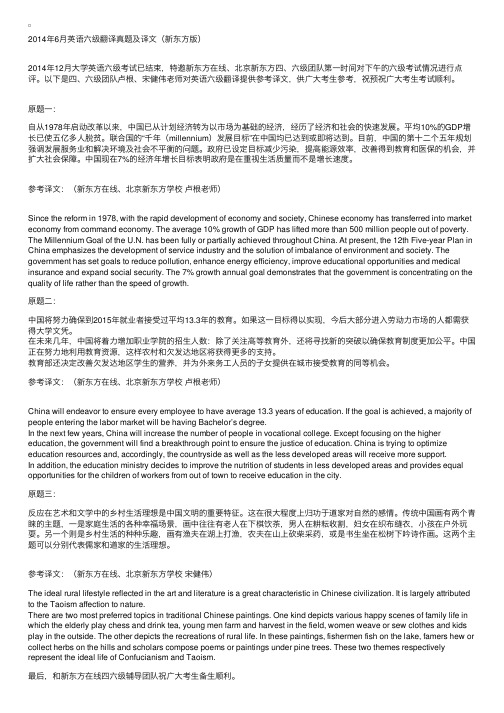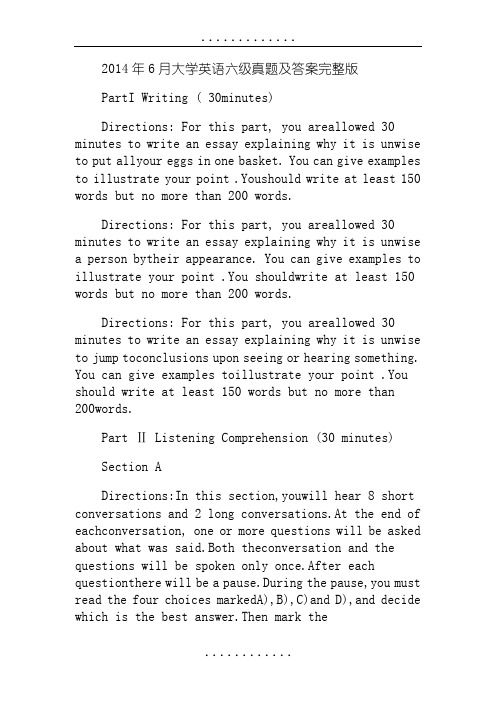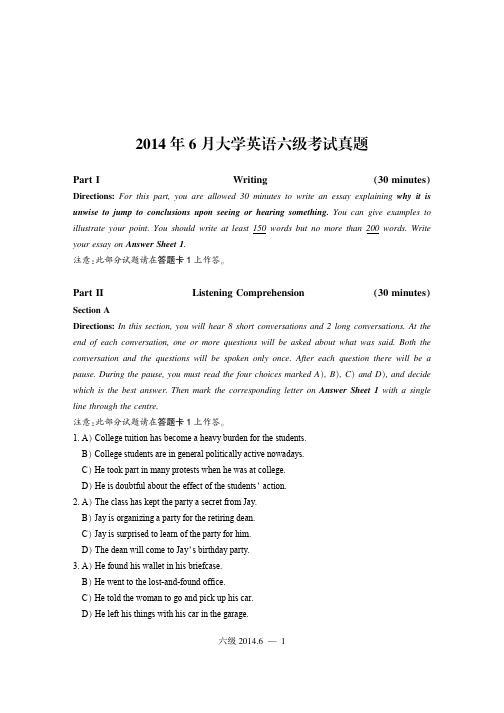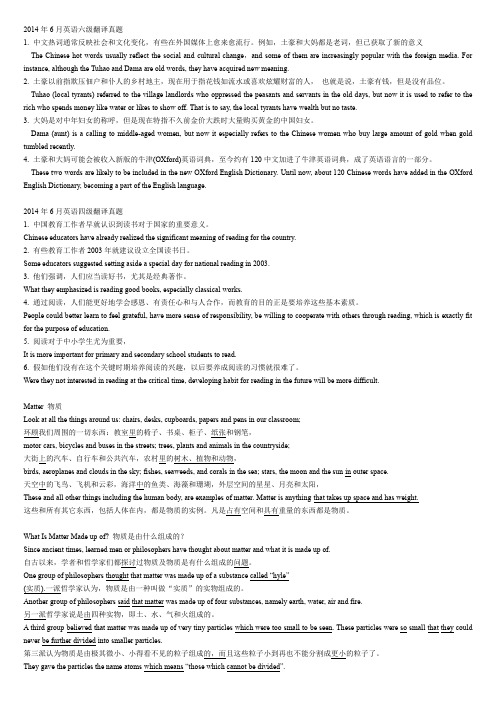2014年6月英语六级翻译真题及参考译文:中国热词
2014年6月英语六级翻译真题及译文(新东方版)

2014年6⽉英语六级翻译真题及译⽂(新东⽅版)2014年12⽉⼤学英语六级考试已结束,特邀新东⽅在线、北京新东⽅四、六级团队第⼀时间对下午的六级考试情况进⾏点评。
以下是四、六级团队卢根、宋健伟⽼师对英语六级翻译提供参考译⽂,供⼴⼤考⽣参考,祝预祝⼴⼤考⽣考试顺利。
原题⼀:⾃从1978年启动改⾰以来,中国已从计划经济转为以市场为基础的经济,经历了经济和社会的快速发展。
平均10%的GDP增长已使五亿多⼈脱贫。
联合国的“千年(millennium)发展⽬标”在中国均已达到或即将达到。
⽬前,中国的第⼗⼆个五年规划强调发展服务业和解决环境及社会不平衡的问题。
政府已设定⽬标减少污染,提⾼能源效率,改善得到教育和医保的机会,并扩⼤社会保障。
中国现在7%的经济年增长⽬标表明政府是在重视⽣活质量⽽不是增长速度。
参考译⽂:(新东⽅在线、北京新东⽅学校卢根⽼师)Since the reform in 1978, with the rapid development of economy and society, Chinese economy has transferred into market economy from command economy. The average 10% growth of GDP has lifted more than 500 million people out of poverty. The Millennium Goal of the U.N. has been fully or partially achieved throughout China. At present, the 12th Five-year Plan in China emphasizes the development of service industry and the solution of imbalance of environment and society. The government has set goals to reduce pollution, enhance energy efficiency, improve educational opportunities and medical insurance and expand social security. The 7% growth annual goal demonstrates that the government is concentrating on the quality of life rather than the speed of growth.原题⼆:中国将努⼒确保到2015年就业者接受过平均13.3年的教育。
2014年6月大学英语六级考试真题(三)

2014年6月大学英语六级考试真题(三)In June 2014, the CET-6 (College English Test Level 6) was held across China. As one of the most important English proficiency tests for Chinese college students, it assesses students' abilities in listening, reading, writing, and translation.The test consists of four parts: listening comprehension, reading comprehension, writing, and translation. For listening comprehension, students are required to listen to a recording and answer multiple-choice questions based on what they have heard. The reading comprehension section tests students' ability to understand and analyze English texts, including both articles and passages.In the writing section, students are asked to write an essay on a given topic within a certain time frame. This part aims to test their ability to express their ideas clearly and logically in written English. The final part of the test is translation, where students need to translate a passage from Chinese into English. This tests their understanding of both languages and their ability to transfer meaning accurately.Overall, the CET-6 is considered a challenging test that requires students to have a strong grasp of English grammar,vocabulary, and comprehension skills. Many students spend months preparing for the exam by studying English textbooks, practicing listening and reading exercises, and improving their writing and translation skills.The results of the CET-6 are important for students looking to apply for graduate programs, scholarships, or jobs that require English proficiency. A good score can open up many opportunities for students in their academic and professional careers.In conclusion, the 2014 June CET-6 exam was a significant event for thousands of college students in China. It tested their English language abilities and provided them with an opportunity to demonstrate their proficiency in the language. For many students, passing the CET-6 is a major achievement and a stepping stone towards their future goals.。
2014年6月大学英语六级真题及-答案完整版

2014年6月大学英语六级真题及答案完整版PartI Writing ( 30minutes)Directions: For this part, you areallowed 30 minutes to write an essay explaining why it is unwise to put allyour eggs in one basket. You can give examples to illustrate your point .Youshould write at least 150 words but no more than 200 words.Directions: For this part, you areallowed 30 minutes to write an essay explaining why it is unwise a person bytheir appearance. You can give examples to illustrate your point .You shouldwrite at least 150 words but no more than 200 words.Directions: For this part, you areallowed 30 minutes to write an essay explaining why it is unwise to jump toconclusions upon seeing or hearing something. You can give examples toillustrate your point .You should write at least 150 words but no more than200words.Part Ⅱ Listening Comprehension (30 minutes)Section ADirections:In this section,youwill hear 8 short conversations and 2 long conversations.At the end of eachconversation, one or more questions will be asked about what was said.Both theconversation and the questions will be spoken only once.After each questionthere will be a pause.During the pause,you must read the four choices markedA),B),C)and D),and decide which is the best answer.Then mark thecorrespondingletter on Answer Sheet1 with a single line through the centre.注意:此部分试题请在答题卡1上作答。
2014年6月英语六级真题(含答案)中文对照

2014 年年英语六级真题A 节方向:在本节中,你将听到8 短对话和 2 长时间谈话。
注意:此部分试题请在答题卡1上作答。
他们可能是赃物的 1.A)B)他们可能是假冒产品C)他们可能是有缺陷的产品D)他们可能好走私2.A) 他们是公务员B)他们是求职者C)他们都是记者D)他们是公众演讲3.A)人已决定辞去他的电脑课B)女人想要获得学位的管理C)计算机学位是一个必须为行政工作D)男人去换他的计算机课的时间4.A)大量的参赛者参加演出B) 第五届的参赛者赢得了最高奖C)那不是如他所预期的一样令人兴奋D)它是由一个汽车制造商赞助5.)阅读报纸专栏B)看着一张火车时刻表C)驾驶从纽约到波士顿D)等待在机场的人6.)他穿着一件外套,在商场里买了B)他在理发店里得到一份新工作C)他了一根手指,昨晚受伤D)他昨天剪了头发7.)他不能欣赏毕加索的画展B)甚至是他的外甥可以抽奖,毕加索C)他不是对现代绘画印象颇深D)一些图纸由幼儿园的小朋友都是优秀8.A)他不应该本末倒置B)他的行为不符合他的话C)他向学生政府的态度已经改变了D)他很久以来参与学生会9 到11 的问题都基于你刚才听到的谈话9.A)她离开她自己的车停在曼彻斯特B)什么地方出毛病用她的车C)她想要在周末去旅行D)她车上拿下,t 是早在一周的时间10.A)安全B)大小C)安慰D)成本11.A)第三方保险B)增值税C)汽油D)车损险问题12 到15 基于你刚才听到的谈话12.A)如何更新基本设施B)怎样做才能提高他们的地位C)在哪里可以找到他们的植物D)如何吸引投资13.A) 他们与其他欧洲国家联系的路是快速B)他们都设在法国南部C)他们都非常靠近彼此D)其基本的设施都很好懂得可真) 尽量避免作出草率的决定B)利用到列车链接C)与地方当局的谈话D)先进行田野调查15.A) 未来产品分布B)本地工人的就业政策C)公路和铁路的链接,为小城镇的D)熟练的员工队伍,丘陵区B 节方向:在这部分中,你会听到 3 短的段落。
2014年6月大学英语六级真题及答案真题+听力原文+答案详解.docx

2014 年 6 月英语六级真题及答案Part I WritingDirections: For this part, you are allowed 30 minutes to write a short essay on the topic of Due Attention Should Be Given to the Study of Chinese Yo u should write at Chinese. least 120 words following the outline given belo w:1.近年来在学生中出现了忽视中文学习的现象;2.出现这种现象的原因和后果;3我认为,Given Due Attention Should Be Given to the Study of ChinesePart II Reading Comprehension (Skimming and Scanning) (15 minute s)Directions: In this part, you will have 15 minutes to go over the passage qu ickly and answer the questions on Answer sheet 1. For questions 1-7, choo se the best answer from the four choices marked A), B), C) and D). For qu estions 8-10, complete the sen-tences with the information given in the pas sage. Welcome,Freshmen. Have an iPod.Taking a step that many professors may view as a bit counterproductive, so me colleges and universities are doling out Apple iPhones and Internet-cap able iPods to their students.The always-on Internet devices raise some novel possibilities, like tracking where students gather together. With far less controversy, colleges could s end messages about canceled classes, delayed buses, campus crises or just the cafeteria menu.While schools emphasize its usefulness —online research in class and inst ant polling of students, for example — a big part of the attraction is, undou btedly, that the iPhone is cool and a hit with students. Being equipped with one of the most recent cutting-edge IT products could just help a college o r university foster a cutting-edge reputation.Apple stands to win as well, hooking more young consumers with decadesof technology pur- chases ahead of them. The lone losers, some fear, could be professors.Students already have laptops and cell phones, of course, but the newest de vices can take class distractions to a new level. They practically beg a user to ignore the long-suffering professor strug- gling to pass on accumulated wisdom from the front of the room — a prospect that teachers find most irr itating and students view as, well, inevitable.“ When it gets a little boring, I might pull it out,‖acknowledged Naomi P ugh, a first-year student at Freed-Hardeman University in Henderson, Ter m., referring to her new iPod Touch, which can connect to the Internet ove r a campus wireless network. She speculated that professors might try even harder to make classes interesting if they were to compete with the devices. Experts see a movement toward the use of mobile technology in educati on, though they say it is in its infancy as professors try to come up with us eful applications. Providing powerful hand- held devices is sure to fuel deb ates over the role of technology in higher education.“ We think this is the way the future is going to work,‖said Kyle Dickson, co-director of re- search and the mobile learning initiative at Abilene Chris tian University in Texas, which has bought more than 600 iPhones and 300 iPods for students entering this fall.Although plenty of students take their laptops to class, they don’t take the m everywhere and would prefer something lighter. Abilene Christian settle d on the devices after surveying students and finding that they did not like hauling around their laptops, but that most of them always carried a cell ph one, Dr. Dickson said.It is not clear how many colleges and universities plan to give out iPhones and iPods this fall; officials at Apple were unwilling to talk about the subje ct and said that they would not leak any institution plans’s.“ We can’t announce other people’s news,‖saidGreg Joswiak, vice presid ent of iPod and iPhone marketing at Apple. He also said that he could not d iscuss discounts to universities for bulk purchases.At least four institutions — the University of Maryland, Oklahoma Christi an University, Abilene Christian and Freed-Hardeman — have announced t hat they will give the devices to some or all of their students this fall.Other universities are exploring their options. Stanford University has hire d a student-run com-pany to design applications like a campus map and dir ectory for the iPhone. It is considering whether to issue iPhones but not sur e it, snecessary, noting that more than 700 iPhones were registered on the u niversity network’s last year.At the Massachusetts Institute of Technology, iPhones might alreadyhave been everywhere, if AT&T, the wireless carrier offering the iPhone in the United States,had a more reliable network, said Andrew Yu, mobile devices platform pro ject manager at M.I.T.“ We would have probably gone ahead with this, maybe just getting a thou sand iPhones and giving them out, ‖Mr. Yusaid.The University of Maryland at College Park is proceeding cautiously, givi ng the iPhone or iPod Touch to 150 students, said Jeffrey Huskamp, vice p resident and chief information officer at the university. ― Wedon’t think tha t we have all the answers, Mr‖. Huskamp said. By observing how students use the gadgets, he said,― We’ retrying to get answers from the students. ‖ At each college, the students who choose to get an iPhone must pay for mo bile phone service. Those service contracts include unlimited data use. Both the iPhones and the iPod Touch devices can connect to the Internet throu gh campus wireless networks. With the iPhone, those networks may provid e faster connections and longer battery life than A T&T’s data network. Many cell phones allow users to surf the Web, but only some newer ones are c apable of wireless connection to the local area computer network. University officials say that they have no plans to track their students (and Apple said it would not be possible unless students give their permission). They say that they are drawn to the prospect of learning applications outsid e the classroom, though such lesson plans have yet to surface.“ My colleagues and I are studying something called augmented reality (a field of computer research dealing with the combination of real-world and virtual reality), said‖ Christopher Dede, professor in learning technologies at Harvard University. ― AlienContact, for‖ example, is an exer- cise develo ped for middle-school students who use hand-held devices that can determi ne their location. As they walk around a playground or other area, text, vid eo or audio pops up at various points to help them try to figure out why ali ens were in the schoolyard.“ You can imagine similar kinds of interactive activities along historical li nes, ‖like following the Freedom Trail in Boston, Professor Dede said.― It’s important that we do research, so that we know how well something like this works. ‖The rush to distribute the devices worries some professors, who say that st udents are less likely to participate in class if they are multi-tasking. ― I ’m n ot someone who’s anti-technology, but I,m always worried that technology becomes an end in and of itself, and it replaces teaching or it replaces analysis,, said’Ellen Millender, associate professor of classics at Reed College in Portland, Ore. (She added that she hoped to buy an iPhone for herself on ce prices fall.)Robert Summers, who has taught at Cornell Law School for about 40 years,announced this week — in a detailed, footnoted memorandum — that he would ban laptop computers from his class on contract law.“ I would ban that too if I knew the students were using it in class, Profes‖sor Summers said of the iPhone, after the device and its capabilities were e xplained to him. ― Whatwe want to encour- age in these students is an activ e intellectual experience, in which they develop the wide range of complex reasoning abilities required of good lawyers. ‖The experience at Duke University may ease some concerns. A few years a go, Duke began giving iPods to students with the idea that they might use t hem to record lectures (these older models could not access the Internet).“ We had assumed that the biggest focus of these devices would be consu ming the content, said‖ Tracy Futhey, vice president for informationtechn ology and chief information officer at Duke.But that is not all that the students did. They began using the iPods to creat e their own ― content, making‖ audio recordings of themselves and presenti ng them. The students turned what could have been a passive interaction in to an active one, Ms. Futhey said. 注意:此部分试题请在答题卡 1 上作答。
2014年6月六级真题及答案-精心整理版

2014年6月英语六级真题及答案(精心整理版)Part I WritingDirections: For this part, you are allowed 30 minutes to write a short essay on the topic of Due Attention Should Be Given to the Study of Chinese Yo u should write at Chinese. least 120 words following the outline given belo w:1.近年来在学生中出现了忽视中文学习的现象;2.出现这种现象的原因和后果;3我认为…Given Due Attention Should Be Given to the Study of ChinesePart II Reading Comprehension (Skimming and Scanning) (15 minute s)Directions: In this part, you will have 15 minutes to go over the passage qu ickly and answer the questions on Answer sheet 1. For questions 1-7, choo se the best answer from the four choices marked A), B), C) and D). For qu estions 8-10, complete the sen-tences with the information given in the pas sage. Welcome,Freshmen. Have an iPod.Taking a step that many professors may view as a bit counterproductive, so me colleges and universities are doling out Apple iPhones and Internet-cap able iPods to their students.The always-on Internet devices raise some novel possibilities, like tracking where students gather together. With far less controversy, colleges could s end messages about canceled classes, delayed buses, campus crises or just the cafeteria menu.While schools emphasize its usefulness —online research in class and inst ant polling of students, for example — a big part of the attraction is, undou btedly, that the iPhone is cool and a hit with students. Being equipped with one of the most recent cutting-edge IT products could just help a college o r university foster a cutting-edge reputation.Apple stands to win as well, hooking more young consumers with decades of technology pur-chases ahead of them. The lone losers, some fear, could be professors.Students already have laptops and cell phones, of course, but the newest de vices can take class distractions to a new level. They practically beg a user to ignore the long-suffering professor strug-gling to pass on accumulated wisdom from the front of the room — a prospect that teachers find most irr itating and students view as, well, inevitable.“When it gets a little boring, I might pull it out,‖ acknowledged Naomi P ugh, a first-year student at Freed-Hardeman University in Henderson, Ter m., referring to her new iPod Touch, which can connect to the Internet ove r a campus wireless network. She speculated that professors might try even harder to make classes interesting if they were to compete with the devices. Experts see a movement toward the use of mobile technology in educati on, though they say it is in its infancy as professors try to come up with us eful applications. Providing powerful hand-held devices is sure to fuel deb ates over the role of technology in higher education.“We think this is the way the future is going to work,‖ said Kyle Dickson, co-director of re-search and the mobile learning initiative at Abilene Chris tian University in Texas, which has bought more than 600 iPhones and 300 iPods for students entering this fall.Although plenty of students take their laptops to class, they don’t take the m everywhere and would prefer something lighter. Abilene Christian settle d on the devices after surveying students and finding that they did not like hauling around their laptops, but that most of them always carried a cell ph one, Dr. Dickson said.It is not clear how many colleges and universities plan to give out iPhones and iPods this fall; officials at Apple were unwilling to talk about the subje ct and said that they would not leak any institution’s plans.“We can’t announce other people’s news,‖said Greg Joswiak, vice presid ent of iPod and iPhone marketing at Apple. He also said that he could not d iscuss discounts to universities for bulk purchases.At least four institutions — the University of Maryland, Oklahoma Christi an University, Abilene Christian and Freed-Hardeman — have announced t hat they will give the devices to some or all of their students this fall.Other universities are exploring their options. Stanford University has hire d a student-run com-pany to design applications like a campus map and dir ectory for the iPhone. It is considering whether to issue iPhones but not sur e it, snecessary, noting that more than 700 iPhones were registered on the u niversity’s network last year.At the Massachusetts Institute of Technology, iPhones might already have been everywhere, if AT&T, the wireless carrier offering the iPhone in the United States,had a more reliable network, said Andrew Yu, mobile devices platform pro ject manager at M.I.T.“We would have probably gone ahead with this, maybe just getting a thou sand iPhones and giving them out,‖ Mr. Yusaid.The University of Maryland at College Park is proceeding cautiously, givi ng the iPhone or iPod Touch to 150 students, said Jeffrey Huskamp, vice p resident and chief information officer at the university. ―We don’t think tha t we have all the answers,‖ Mr. Huskamp said. By observing how students use the gadgets, he said, ―We’re trying to get answers from the students.‖At each college, the students who choose to get an iPhone must pay for mo bile phone service. Those service contracts include unlimited data use. Bot h the iPhones and the iPod Touch devices can connect to the Internet throu gh campus wireless networks. With the iPhone, those networks may provid e faster connections and longer battery life than AT&T’s data network. Many cell phones allow users to surf the Web, but only some newer ones are c apable of wireless connection to the local area computer network. University officials say that they have no plans to track their students (and Apple said it would not be possible unless students give their permission). They say that they are drawn to the prospect of learning applications outsid e the classroom, though such lesson plans have yet to surface.“My colleagues and I are studying something called augmented reality (a field of computer research dealing with the combination of real-world and virtual reality),‖ said Christopher Dede, professor in learning technologies at Harvard University. ―Alien Contact,‖ for example, is an exer-cise develo ped for middle-school students who use hand-held devices that can determi ne their location. As they walk around a playground or other area, text, vid eo or audio pops up at various points to help them try to figure out why ali ens were in the schoolyard.“You can imagine similar kinds of interactive activities along historical li nes,‖ like following the Freedom Trail in Boston, Professor Dede said. ―It’s important that we do research, so that we know how well something like this works.‖The rush to distribute the devices worries some professors, who say that st udents are less likely to participate in class if they are multi-tasking. ―I’m n ot someone who’s anti-technology, but I,m always worried that technology becomes an end in and of itself, and it replaces teaching or it replaces analysis,,’ said Ellen Millender, associate professor of classics at Reed College in Portland, Ore. (She added that she hoped to buy an iPhone for herself on ce prices fall.)Robert Summers, who has taught at Cornell Law School for about 40 years , announced this week — in a detailed, footnoted memorandum —that he would ban laptop computers from his class on contract law.“I would ban that too if I knew the students were using it in class,‖ Profes sor Summers said of the iPhone, after the device and its capabilities were e xplained to him. ―What we want to encour-age in these students is an activ e intellectual experience, in which they develop the wide range of complex reasoning abilities required of good lawyers.‖The experience at Duke University may ease some concerns. A few years a go, Duke began giving iPods to students with the idea that they might use t hem to record lectures (these older models could not access the Internet). “We had assumed that the biggest focus of these devices would be consu ming the content,‖ said Tracy Futhey, vice president for information techn ology and chief information officer at Duke.But that is not all that the students did. They began using the iPods to creat e their own ―content,‖ making audio recordings of themselves and presenti ng them. The students turned what could have been a passive interaction in to an active one, Ms. Futhey said. 注意:此部分试题请在答题卡1上作答。
2014年6月大学英语六级考试真题含答案解析

D冤 Train clients to use financial software.
20. A冤 Rewarding.
B冤 Unsuccessful.
C冤 Tedious. 21. A冤 He provided individual support.
D冤 Important.
B冤 He held group discussions.
渊30 minutes冤
Section A
Directions: In this section, you will hear 8 short conversations and 2 long conversations. At the
end of each conversation, one or more questions will be asked about what was said. Both the
D冤 He didn爷t expect to complete his work so soon.
8. A冤 He has failed to register for the course.
B冤 He would like to major in psychology too.
C冤 There should be more time for registration.
18. A冤 To make the building appear traditional.
B冤 To cut the construction cost to the minimum.
C冤 To match the style of construction on the site.
D冤 To embody the subcommittee爷s design concepts.
翻译

2014年6月英语六级翻译真题1. 中文热词通常反映社会和文化变化,有些在外国媒体上愈来愈流行。
例如,土豪和大妈都是老词,但已获取了新的意义The Chinese hot words usually reflect the social and cultural change,and some of them are increasingly popular with the foreign media. For instance, although the Tuhao and Dama are old words, they have acquired new meaning.2. 土豪以前指欺压佃户和仆人的乡村地主,现在用于指花钱如流水或喜欢炫耀财富的人,也就是说,土豪有钱,但是没有品位。
Tuhao (local tyrants) referred to the village landlords who oppressed the peasants and servants in the old days, but now it is used to refer to the rich who spends money like water or likes to show off. That is to say, the local tyrants have wealth but no taste.3. 大妈是对中年妇女的称呼,但是现在特指不久前金价大跌时大量购买黄金的中国妇女。
Dama (aunt) is a calling to middle-aged women, but now it especially refers to the Chinese women who buy large amount of gold when gold tumbled recently.4. 土豪和大妈可能会被收入新版的牛津(OXford)英语词典,至今约有120中文加进了牛津英语词典,成了英语语言的一部分。
- 1、下载文档前请自行甄别文档内容的完整性,平台不提供额外的编辑、内容补充、找答案等附加服务。
- 2、"仅部分预览"的文档,不可在线预览部分如存在完整性等问题,可反馈申请退款(可完整预览的文档不适用该条件!)。
- 3、如文档侵犯您的权益,请联系客服反馈,我们会尽快为您处理(人工客服工作时间:9:00-18:30)。
2014年6月英语六级翻译真题及参考译文:中国热词
来源:文都教育
【六级翻译真题原文】
中文热词通常反映社会变化和文化,有些在外国媒体上愈来愈流行。
例如,土豪和大妈都是老词,但已获取了新的意义。
土豪以前指欺压佃户和仆人的乡村地主,现在用于指花钱如流水或喜欢炫耀财富的人,也就是说,土豪有钱,但是没有品位。
大妈是对中年妇女的称呼,但是现在特指不久前金价大跌时大量购买黄金的中国妇女。
土豪和大妈可能会被收入新版的牛津(OXford)英语词典,至今约有120中文加进了牛津英语词典,成了英语语言的一部分。
【文都教育参考译文】
The Chinese hot words usually reflect the social and cultural change, some of them are increasingly popular with the foreign media. For instance, although the Tuhao and Dama are old words, they have acquired new meaning.
Tuhao (local tyrants) referred to the village landlords who oppressed the peasants and servants in the old days, but now it is used to refer to the rich who spends money like water or likes to showing off. That is to say, the local tyrants have wealth but no taste. Dama (aunt) is a calling to middle-aged women, but now it especially refers to the Chinese women who buy large amount of gold when gold tumbled recently.
These two words are likely to be include in the new OXford English Dictionary. Until now, about 120 Chinese word have added in the OXford English Dictionary, becoming a part of the English language.。
